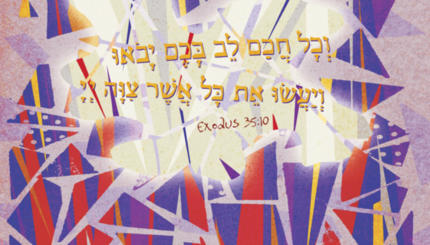At that moment I felt utterly violated, encroached upon. I know that it sounds like I am exaggerating but I just felt polluted, sullied. On the one hand I wanted to run away, to just get out of there, and on the other hand I didn’t want to completely own my own emotions. I just sat there, trying to look and act and feel as if nothing happened, just like everyone else in the room was looking and acting as if nothing had happened. But something had happened, something that felt terrible. My inner spirit had been desecrated.
I asked myself if anyone else felt like I did. Was anyone else as disgusted and hurt as I was? No one appeared to be affected. But then again, on the outside, I also showed no outward signs of what was going on inside.
I had been spending a few days with a motley group of American rabbis of all the varied denominations. Many of them I know well; I have deep affection and respect for them. We were in the midst of a talent show; it was supposed to be fun, after a long day with our noses to the grindstone.
Then I heard it. She said it, and she said it again and again. The F word. And it was not only her. Others repeated the word during their performances. Emphatically. I was shocked. Everyone laughed at the jokes. They clapped, and they hooted. I couldn’t. I felt so alone, so different, so alienated. At that moment I was certain that I did not belong.
Forty years ago, back in high school, such speech was commonplace in my life. Now that I think about it, although I heard it all the time back then, rarely if ever did I myself talk like that. Even then it was just too coarse for me, too vile. Even then I intuited that such words were just too immodest for me.
Since then I have almost never heard those words. I live a cloistered life you could say. I spent 10 years studying in one of the finest yeshivot (yeshivas, or Talmudic academies) in the world. I certainly did not hear such language there. And since then I have been teaching and studying it. I spend a good deal of my time in the study hall or in my study, in the library or in the synagogue.
There is no television in our home. I live in a small town in Israel where many of the people are like me. No one uses such language here. I had not realized the purity of my environment until now.
One part of me says get over it. It’s only language, only words. There is nothing objectively problematic with vulgarity. It’s only a matter of social custom and what you are used to. Different subcultures speak differently. I shouldn’t expect my American rabbi friends, who have to be immersed in American pop culture in order to do their jobs of connecting to the people where they are at, to maintain the same standards of language as I do. “Stop trying to impose my Orthodox standards on my colleagues in the liberal denominations,” I say to myself.
But I can’t buy it. It is not called vulgarity for naught. There is something dirty about it. Even today, American culture recognizes certain expressions as unfit for polite company.
Our Jewish tradition is very concerned about “clean” language. It urges us to distance ourselves from “nibul peh,” from coarse language that dirties our mouths and blemishes our souls.
Rabbis who are out in the trenches may be forced to hear such language, but they need not adopt it. We have to behave according to a higher standard and serve as an example to ourselves, our families, and our congregants. If we don’t model holiness for them, who will?
The only other time since high school when I heard such a barrage of filthy language was about six months ago. Some new friends of mine took me to a comedy club. Four young secular American Muslim comedians were appearing. Everyone was laughing. I tried to laugh as well. I couldn’t. But what most struck me was this: One of the comedians saw me, a rabbi, seated in the first row. Standing on stage before his routine, he paused, looked at me, put his hand over his heart and said: “Rabbi, I am sorry for what you are about to hear. I know it’s not right”.
That really touched me. He knew there was something not right about the foul language he was about to use. Shouldn’t we rabbis know that as well?



